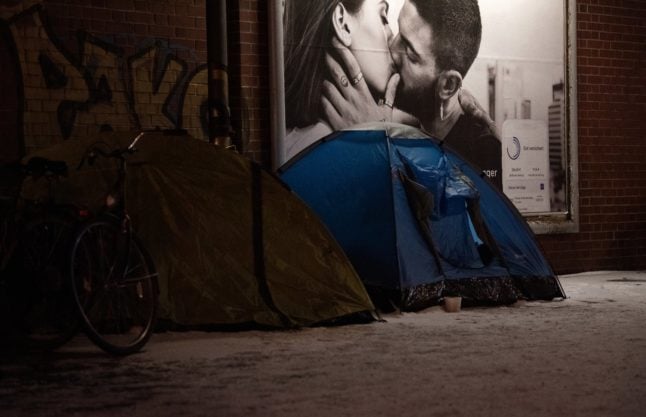Petra’s story reflects the struggle of the estimated 2,500 homeless women in the German capital, who have become even more vulnerable in the coronavirus outbreak.
It is dusk at “Evas Obdach” (Eva’s Shelter) in Neukölln, Berlin’s largest district and one of its most ethnically diverse.
After a full day in the winter cold, women carrying heavy bags or dragging overladen shopping trolleys behind them file in, visibly weary.
They can get a warm meal here, take a shower and spend the night, all in a comparably safe environment.
Petra, who is in her 60s, takes a seat.
“Look how nice it is here — it’s really a place that’s made for us. They even have different kinds of tea,” she says in a soft voice, cracking a hesitant smile.
‘Corona put me on the street’
She is one of the few women willing to talk a bit about her story, on condition only her first name be used.
Petra had arrived in Berlin last March, at the beginning of Germany’s first shutdown.
She was counting on staying in a small hotel but was refused a room because coronavirus restrictions outlawed overnight stays except for business travellers.
READ ALSO: How homeless people in Germany are being supported during the coronavirus crisis
She ended up at a city mission and has been bouncing from shelter to shelter ever since.
Asked why she moved to the capital and how much money she had when she did, Petra is not very forthcoming with answers but she’s sure of one thing: “Corona put me on the street.”
“I was trained as a chemist, I worked in restaurants, I had a career… I never thought this would happen to me,” she said.
Official statistics about the number of people in Germany rendered homeless during the pandemic and its ensuing economic crisis are hard to come by.
“Nothing indicates at the moment that it has risen sharply,” said Werena Rosenke, director of the BAG association which groups several homeless aid organisations.
“But you may start to see it after the pandemic, when eviction orders — which are currently suspended — are carried out,” she told AFP.
Advocates say that reliable statistics about affected people are sorely lacking.
In Berlin, a voluntary census in early 2020 — before the Covid-19 outbreak — counted nearly 2,000 people without homes, but charity groups put the number far higher, at between 6,000 and 9,000 including around 2,500 women.
‘Sense of shame’
Natalie Kulik, the founder of Evas Obdach, said their unique plight is often invisible to policy-makers and the society at large.
Women try to avoid the street as long as possible, even if it means enduring violence in their marriage or turning to prostitution to pay the rent, she said.

A homeless person holding a sign reading ‘no home, no work, hungry, thank you.’ Photo: DPA
And if they end up failing to keep a roof over their heads, they often try to hide their situation, “paying particular attention to their appearance,” Kulik said, blaming “a sense of shame”.
“The street is dangerous for them,” she said.
Protection in a mixed shelter is often paid for with sexual favours.
“Most of our guests here would never admit to being homeless,” she said. Genevieve, a talkative Frenchwoman in her 50s spending the night at the shelter, is just one example.
READ ALSO: Number of people without a home rises in Germany
“I pay my rent but I cannot return to my place because my neighbours harass me,” said Genevieve, who has lived in Berlin for 20 years, many of them alone since her divorce.
“People think I’m crazy when I tell my story,” she said.
Survival strategy
The pandemic compounds the psychological stress faced by homeless women, whose mental state is often fragile, Kulik said.
“You see some creating their own worlds — a survival strategy” that makes them resistant to help.
The restrictions under the Covid-19 shutdown have generally worsened the precarious living conditions of all homeless people, charity groups agree.
Income sources such as collecting deposit bottles or panhandling have dried up as people stay home.
Shelters themselves have had to cut the number of available beds to accommodate social distancing.
This winter, the Berlin government expanded temporary housing facilities by renting empty hotels, spokesman Stefan Strauss told AFP, adding that a coronavirus vaccination programme for the homeless should begin “soon”.
But with the arrival of spring, there is a risk that “all the additional assistance will disappear”, warned Anett Leach of the charity association Klik, which helps young people with housing and social difficulties.



 Please whitelist us to continue reading.
Please whitelist us to continue reading.
Is it really necessary to make everything a gendered issue now? Everything in this article applies to men, women, and people of any other gender for that matter. Is it so terrible to just talk about the effect of a human story on human beings. For once?